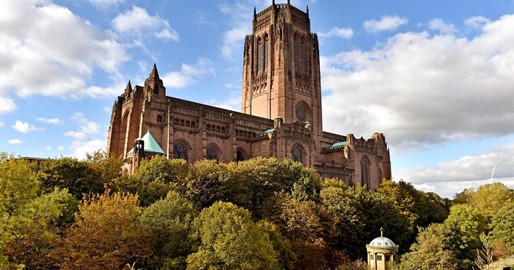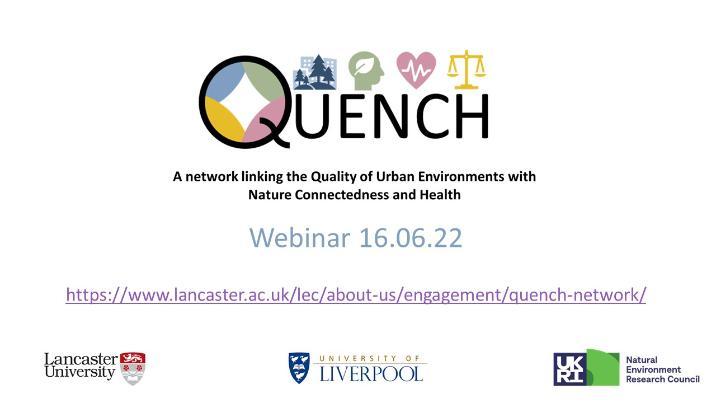QUENCH Events
Tab Content: Initial QUENCH Workshops
QUENCH Networking Building and Collaborative Funding Workshops (Feb-March 2022)
A key part of building the QUENCH network involved five workshops in Early 2022 that helped to make new collaborations between participants, with pump priming funds available for supporting the development of research projects.
From 120+ applications to participate in the workshops, 42 individuals across diverse academic disciplines (including ecology, environmental sciences, psychology, health sciences, geography), local and national government departments, third sector and private organisations were selected to take part. Participants were selected to cover early-, mid- and advanced-career positions, as well as inclusive across groups commonly under-represented at events like ours.
There were a total of five half-day workshops that took place over a three-week period. While all workshops took place online, they were designed to be engaging and allow for opportunities to meet people. Alongside the QUENCH facilitation team, the workshops were supported by five fantastic mentors:
- Charlotte Russell (The Eden Project)
- Katherine Irvine (The James Hutton Institute)
- Piran White (University of York)
- Rich Fry (Swansea University)
- Rosie Hails (National Trust)
The first two workshops focused on developing diverging ideas through building connections across members of the QUENCH workshops to identify new research opportunities together. In the first workshop, participants had the opportunities to meet others in the network. QUENCH mentors introduced themselves and gave short presentations outlining interesting areas for future research. The second workshop saw continued opportunities for networking and participants were invited to start thinking about the research connections across participants. We began to populate ideas and research gaps to focus on.
We then moved onto a process of converging ideas into feasible research projects. In workshop three participants began to identify projects that could answer research gaps aligned to the QUENCH key research questions. Teams began to form around these questions and we looked to ensure that all teams had a mix of environmental science expertise combined with other research disciplines and practitioners from different sectors. In the fourth workshop, research groups received feedback from mentors helping them to refine their ideas further prior to submitting proposals to the mentoring team.
The final workshop was an opportunity for all research project teams to pitch their proposals. In total, we had seven presentations across themes including inequalities in environmental quality, urban food growing, pollinators and mental wellbeing, nature connectedness in young people, and the benefits of private gardens.
A total of five projects were funded following a scoring process based on reviews by the QUENCH mentors and votes submitted by participants. You can find out more about these on the projects section of the QUENCH website.
We thank all participants and mentors for enabling the QUENCH workshops to be successful. We look forward to finding out more from the project teams as their research progresses over the summer.
Tab Content: QUENCH webinar 16 June 2022
The first open QUENCH webinar was held on 16th June 2022.
Bringing together academics and practitioners from a wide range of disciplines, sectors and organisations to discuss the links between the quality of urban environments, nature connectedness, and health outcomes, the programme included:
- Updates from and discussion with the five funded QUENCH projects
- Helen Chatterjee, Arts and Humanities Research Council (AHRC), on the AHRC’s health disparities research programme, including QUENCH-related projects already funded and connections to current and future funding opportunities
- Dave Bell, Natural England, on their work and future plans around the QUENCH agenda, including possibilities for supporting related projects
You can watch the recording on our YouTube channel, or check out the individual presentation slide decks at the links below:
QUENCH webinar presentation_Introduction
QUENCH webinar presentation_Natural England, Dave Bell
QUENCH webinar presentation_Why do we dig gardens
QUENCH webinar presentation_Quality Inequalities
QUENCH webinar presentation_Making space for young people
QUENCH webinar presentation_EQUI-FOOD
Tab Content: QUENCH Celebration Event
QUENCH Celebration Event
On September 22nd 2022 QUENCH held an in-person event at the Anglican Cathedral in Liverpool to celebrate the achievements of the network and the projects that it has funded, hear from keynote speakers from the worlds of environmental monitoring, health, and green social prescribing, and think collectively about the next steps for the network.

The day was highly energised and embodied the collaborative spirit that the network has built across academic disciplines and with multi-sector practitioners. The presentations from the day - progress updates and preliminary findings from the projects, inspiring talks from our keynote speakers, and thoughts about future challenges and opportunities - can be downloaded below.
Short videos summarising highlights from the projects and the network, and the challenges and opportunities ahead, will shortly be available on our YouTube channel.
Project update: - Designed for Connection - Pollinator citizen science for nature connection
Project update: EQUI-Food - Environmental quality impact on urban food growing for better health and wellbeing
Project update: Why do we dig gardens? - How do nature-based activities impact management and outcomes of common mental health disorders, and what affects their relative success and failure?
Project update: Making space for young people - Does ecosystem quality affect nature connectedness and health in a disadvantaged area?
Project update: Quality Inequalities - Do environmental quality and psycho-social factors interact to shape people's experience of connecting with nature, and how?
Quench concept paper: Bringing together different conceptual frameworks for understanding environmental quality
Keynote: Alex Bush - Ecological sensing at scale
Keynote: Sarah Rodgers - A vision for integrating environmental and health data
Keynote: Chris Dayson - Developing and implementing green social prescribing in complex health systems
Keynote: Anthony Hurd - System-level learning from Humber and North Yorkshire green social prescribing programme
Funder: Edoardo Fiordalisi - NERC/UKRI future funding priorities and opportunities


